Introduction: A New Era of Healthcare Accessible to All
Think of a world in which healthcare caters to the unique needs of each person, irrespective of physical or cognitive limitations. For the disabled community, obtaining quality healthcare has been a challenge—until now. AI for special persons’ health is entering a new era of accessibility as a barrier breaking force, improving the quality of life for millions. Whether it’s special needs apps, gear, notions, a school related inform, assistive technology, or even a sneaky way to slam all of that pasta we made back in November, technology is changing the way we help take care of these little people. In this article, we’ll take a look at how AI is changing what’s possible in accessibility, how it’s improving lives and how it’s helping create a more inclusive future.
What Is AI for Special Persons’ Health?
Defining the Concept
AI in special persons’ health Specifically, AI assists in developing personalized healthcare for people with special needs. This population is comprised primarily of individuals who have physical, sensory, cognitive disabilities or complex, chronic health conditions. AI uses data analytics, machine learning and predictive modeling to provide personalized, accessible and cost-effective care.
Why It Matters
The special people’s various requirements cannot be met satisfactorily by the traditional healthcare systems. To fill in this gap, AI is based on: Personalized answers: AI customizes interventions to a result or a condition.
Easier access: Virtual tools mean patients no longer have to visit in person.
Guided support: Devices are AI-enabled guidance mechanism.
How AI Improves Healthcare Accessibility
1. Assistive Technologies for Communication
AI-powered speech-to-text and text-to-speech tools also provide voice for persons with hearing or speech disabilities. “As companies become more and more inclusive, adding real-time transcription services to all conference calls or other company-wide meetings, apps like Ava that provide real-time transcription for conversations will open up a whole new world for people who are deaf in the workplace,” he says.
Real-World Example
A 2023 case study from University of California described how a non-verbal autistic child used an AI-powered communication app to express needs to caregivers, and how frustration lessened and family dynamics improved.
2. Personalized Treatment Plans
AI runs through huge reams of data — your medical history, genetic profile, the details of your lifestyle — to build personalized treatment plans relative to your particular details. AI can generate predictive alerts about complications, along with suggestions for proactive interventions, for people with conditions like cerebral palsy or Down syndrome.
Benefits of Personalized AI Plans
- Accuracy: Tailors treatments to the precise nature of a symptom.
- Adaptability: Is open to modifying plans as conditions change.
- Empowerment: Promotes the participation of patients in care.
3. Remote Monitoring and Telehealth
AI-based wearables and telehealth platforms track vital signs, identify anomalies and hook patients up to specialists remotely. That may be products with fall prevention for senior citizens or glucose monitors for people with diabetes – products where the experience of life is drawn from the devices.
Case Study: Telehealth Success
In 2024, a British telehealth program placed elderly patients with mobility problems under AI surveillance. The system cut hospital visits by 30 percent by alerting caregivers of early signs of health decline.
Cognitive & Sensory Support with AI-Driven Tools
4. Cognitive Assistance for Neurodiverse Individuals
AI will be a game-changer for people with autism, ADHD or dementia. AI chatbots and virtual assistants provide reminders, help in daily tasks and give emotional support. For example, Google’s Project Euphonia uses A.I. to enhance speech recognition for individuals with disabilities with neurological issues.
Key Features
- Task management: Help to remind users about medication or appointments.
- Emotion regulation: AI chatbots pick up on emotional shifts and offer calming strategies.
- Adaptive apps: Apps are customizing learning content for students with diverse learning profiles.
5. Devices to Assist the Visual and Hearing Impaired
AI will improve sensory aids, such as braille displays and hearing aids. For example, Microsoft’s Seeing AI app narrates surroundings for the visually impaired, while AI-powered cochlear implants filter out background noise for clearer sound.
Impact Snapshot
- The visually impaired: AI apps describe objects, read text and navigate environments.
- Hearing loss: Live captioning can aid communication in noisy environments.
Ethical Considerations and Challenges
Ensuring Inclusivity in AI Development
But AI brings vast potential, as well as challenges. Developers have to make sure that algorithms are fair and don’t have a bias. For example, the data used to train AI must be a cross-section of humanity, lest you end up with biased output.
Privacy and Data Security
Securing health data is a matter of national security that cannot be taken lightly. AI systems must be trained in compliance with provisions such as HIPAA to safeguard user data.
Steps to Address Challenges
- Data diversity: Train AI with diverse demographics.
- Transparency: Provide clear information about how AI tools were used to analyze data.
- User consent: Make sure patients know they are giving over their data.
AI in Healthcare of Special Persons in the Future
Emerging Trends
1. The future of AI in special persons’ health is looking bright From developments like:
- Robotics: Paraplegics can work together with AI and exoskeletons for mobility.
- Predictive analytics: The ability to catch conditions like seizures or heart problems before they become more serious.
- Virtual reality (VR): VR for mental health in autism.
A Vision of Inclusion
As AI matures, it holds the potential to achieve a health care system in which no one is left to fall through the cracks. 40% reduction of healthcare disparities for special persons: AI will eliminate the disparity of care among special persons by 2030, making it a level playing field.
FAQs
How AI empowers better access to health care for special people? AI improves access with devices and solutions that help with individuals’s well-being management and attention (regardless of location), and ensures healthcare remains accessible for everyone.
Are AI healthcare tools secure for special people? Yes, as long as they are designed with ethical guidelines and strong security, AI tools are safe for use for children with special needs.
Can AI replace human caregivers? No, AI is to assist the caregivers by automation of tasks and sharing of insights, but the humane touch is irreplaceable.
What are some AI aids for special people? This includes tools like Seeing AI for the blind, Ava for the deaf and AI-driven chatbots for people with cognitive disorders.
Conclusion: Embracing an Accessible Future
AI for special persons’ health isn’t just a tech trend — it’s a shift towards inclusivity and empowerment. Counteracting these barriers, AI is ensuring those with disabilities get the care they need. The range is wide, from assistive appliances to individualized plans. Embracing these changes will help us build a healthcare system that works for everybody.
Action on Artificial Intelligence in Health
What do you think? Tell us your story in the comments — or sign up for our newsletter to receive health tech news delivered to your inbox!



